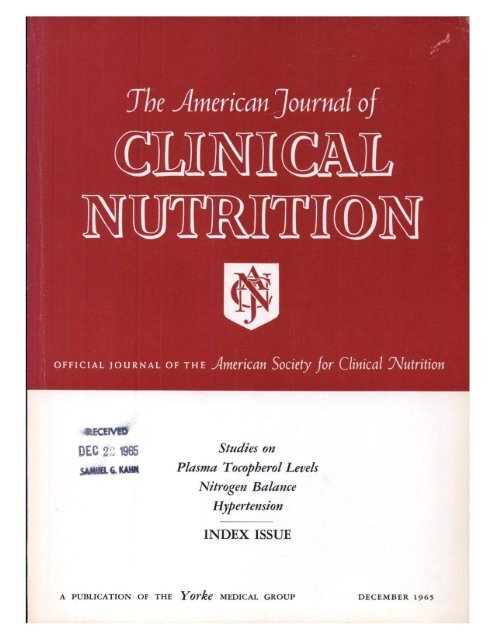Dietary preservatives alter the gut microbiota in vitro and in vivo with sex-specific consequences for host metabolic development in a mouse model
IF 6.5
1区 医学
Q1 NUTRITION & DIETETICS
引用次数: 0
Abstract
Background
Antibiotics in early life can promote adiposity via interactions with the gut microbiota, but they represent only one possible route of antimicrobial exposure. Dietary preservatives exhibit antimicrobial activity, contain chemical structures accessible to microbial enzymes, and may therefore similarly disrupt microbial contributions to metabolic development.
Objectives
Here, we test the hypothesis that preservatives alter the gut microbiota with consequences for host metabolism.
Methods
We screened common dietary preservatives for in vitro and ex vivo activity against a panel of gut bacteria and whole fecal microbial communities, profiling outcomes via optical density measurements and 16S rDNA sequencing. We then exposed adult mice to diet-relevant doses of 4 preservatives [acetic acid, butylated hydroxyanisole (BHA), ethylenediaminetetraacetic acid (EDTA), and sodium sulfite] or ampicillin (positive control) for 7 d. Finally, we examined the effects of early-life EDTA and low-dose ampicillin exposure starting in gestation in a mouse model, tracking differences in growth and metabolism.
Results
Preservatives altered microbial growth and community structure in vitro, ex vivo, and in vivo, but with compound-specific changes in gut microbiota composition distinct from those of ampicillin. Long-term EDTA exposure from gestation reduced calorie absorption and cecal acetate, resulting in 32% lower gains in body fat in females for a given food intake (±12% standard error, linear mixed effects model). Females exposed to ampicillin exhibited a similar 42% (±11%) reduction in food-adjusted gains in adiposity, along with larger brains and smaller livers. By contrast, among males, EDTA had no detectable metabolic impacts whereas ampicillin exposure increased food-adjusted gain in body fat by 108% (±12%).
Conclusions
Our results highlight the potential for everyday doses of common preservatives to affect the gut microbiota and impact metabolism differently in males and females. Thus, despite their generally regarded as safe designation, preservatives could have unintended consequences for consumer health via their impact on the gut microbiota.
在小鼠模型中,膳食防腐剂改变体外和体内肠道微生物群,对宿主代谢发育产生性别特异性后果。
背景:生命早期抗生素可通过与肠道菌群的相互作用促进肥胖,但仅代表一种可能的抗生素暴露途径。膳食防腐剂具有抗菌活性,含有微生物酶可接近的化学结构,因此可能类似地破坏微生物对代谢发育的贡献。目的:在这里,我们验证了防腐剂改变肠道微生物群并影响宿主代谢的假设。方法:我们筛选了常见的膳食防腐剂对肠道细菌和整个粪便微生物群落的体外和离体活性,并通过光密度测量和16S rDNA测序对结果进行了分析。然后,我们将成年小鼠暴露于与饮食相关剂量的4种防腐剂[乙酸、丁基羟基茴香醚(BHA)、乙二胺四乙酸(EDTA)和亚硫酸钠]或氨苄西林(阳性对照)中7天。最后,我们在小鼠模型中检测了从妊娠开始的早期EDTA和低剂量氨苄西林暴露的影响,追踪生长和代谢的差异。结果:防腐剂在体外、离体和体内都改变了微生物的生长和群落结构,但对肠道微生物群组成的改变与氨苄西林不同。妊娠期长期接触EDTA会减少热量吸收和盲肠醋酸盐,导致女性在摄入相同食物时体脂增加减少32%(±12%标准误差,线性混合效应模型)。暴露于氨苄西林的女性表现出类似的42%(±11%)的食物调整的肥胖增加,以及更大的大脑和更小的肝脏。相比之下,在男性中,EDTA没有可检测到的代谢影响,而氨苄西林暴露使食物调整的体脂增加了108%(±12%)。结论:我们的研究结果强调了日常剂量的普通防腐剂对男性和女性肠道微生物群和代谢的影响不同的潜力。因此,尽管防腐剂通常被认为是安全的,但它们可能会通过对肠道微生物群的影响对消费者的健康产生意想不到的后果。
本文章由计算机程序翻译,如有差异,请以英文原文为准。
求助全文
约1分钟内获得全文
求助全文
来源期刊
CiteScore
12.40
自引率
4.20%
发文量
332
审稿时长
38 days
期刊介绍:
American Journal of Clinical Nutrition is recognized as the most highly rated peer-reviewed, primary research journal in nutrition and dietetics.It focuses on publishing the latest research on various topics in nutrition, including but not limited to obesity, vitamins and minerals, nutrition and disease, and energy metabolism.
Purpose:
The purpose of AJCN is to:
Publish original research studies relevant to human and clinical nutrition.
Consider well-controlled clinical studies describing scientific mechanisms, efficacy, and safety of dietary interventions in the context of disease prevention or health benefits.
Encourage public health and epidemiologic studies relevant to human nutrition.
Promote innovative investigations of nutritional questions employing epigenetic, genomic, proteomic, and metabolomic approaches.
Include solicited editorials, book reviews, solicited or unsolicited review articles, invited controversy position papers, and letters to the Editor related to prior AJCN articles.
Peer Review Process:
All submitted material with scientific content undergoes peer review by the Editors or their designees before acceptance for publication.

 求助内容:
求助内容: 应助结果提醒方式:
应助结果提醒方式:


